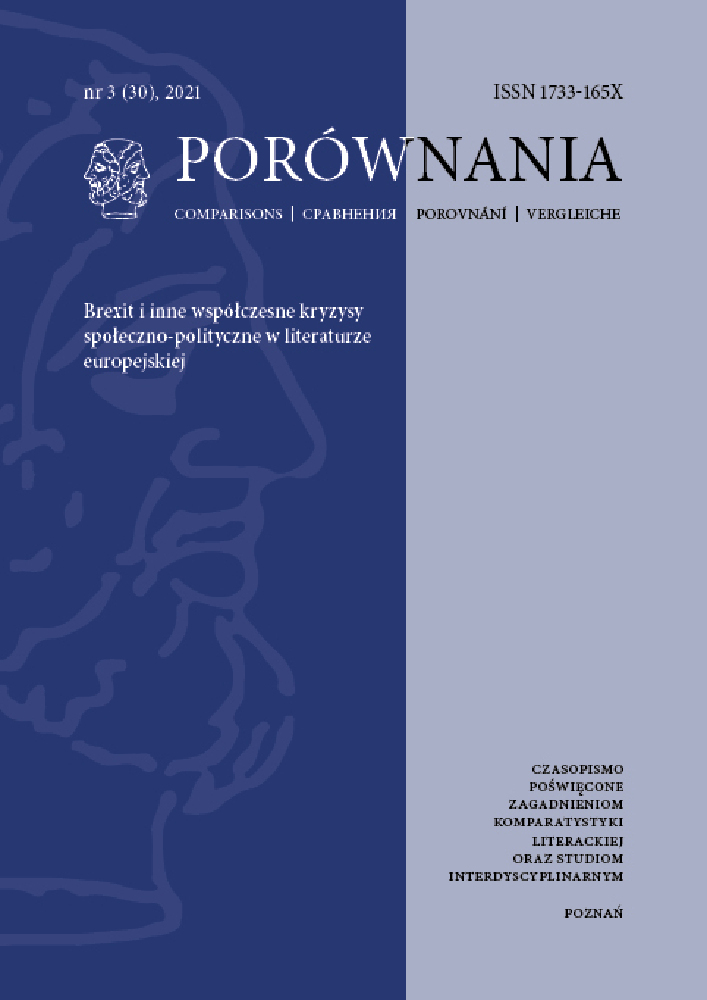Abstrakt
The article reflects on the issues of European social, political and ethical disintegration by looking at two plays which represent both geographic and mental migration of European citizens. Zinnie Harris’s play dramatizes a journey by an energetic businesswoman from the state of seeming success to the condition of collapse of the entire continent. Masłowska’s drama tells the story of a couple who have lost their geographic but also existential bearings after a prolonged bout of drug abuse and partying. The article aims at presenting the European continent as a space of alienated social and personal experience, as a community of people in permanent exile from both the private space and the public ideologies. The two plays offer a reflection on the condition of pre-Brexit Europe with the power of capturing representative lives of those individuals who have lost the sense of the common cause.
Reference
Ash, Timothy, Garton. “Europe’s Endangered Liberal Order.” Foreign Affairs 77. 2 (1998): 51–65.
Ashcroft, Bill, Gareth Griffiths, and Helen Tiffin. “Mimicry.” Post-Colonial Studies. Key Concepts. London and New York: Routledge, 2007. 124–127.
Bhabha, Homi. “Of Mimicry and Man: The Ambivalence of Colonial Discourse.” Discipleship: A Special Issue on Psychoanalysis 28 (1984): 125–133.
Billington, Michael. “How to Hold Your Breath review.” The Guardian 11 Feb. 2015, https://tinyurl.com/5xa5cp43. Accessed 10 May 2021.
Bool, Julia. The New War Plays. From Kane to Harris. Basingstoke: Palgrave Macmillan, 2013.
Fisher, Philip. “A Couple of Poor, Polish-Speaking Romanians.” British Theatre Guide 2008, https://www.britishtheatreguide.info/reviews/poorpolish-rev. Accessed 10 May 20201.
Harris, Zinnie, How to Hold Your Breath. London: Faber and Faber, pdf.
Hauthal, Janine. “‘Provincializing’ Post-Wall Europe: Transcultural Critique of Eurocentric Historicism in Pentecost, Europe and The Break of Day.” Journal of Contemporary Drama in English 3.1 (2015): 28–46.
Inchley, Maggie. Voice and New Writing, 1997–2007: Articulating the Demos. Basingstoke: Palgrave Macmillan, 2015.
Krastev, Ivan. After Europe. Philadelphia: University of Pennsylvania Press, 2017.
Lease, Bryce. “Paweł Demirski and Dorota Masłowska: Painful Pasts, transformative presents.” Contemporary European Playwirghs. Eds. Maria M. Delgado, Bryce Lease and Dan Rebellato. London and New York: Routledge, 2020. 185–203.
Masłowska, Dorota, A Couple of Poor, Polish-Speaking Romanians. Trans. Benjamin Paloff, pdf.
Newton Theatre. “A Couple Of Poor, Polish-Speaking Romanians.” Crikey 04 Aug. 2010, https://tinyurl.com/4semxthu. Accessed 10 May 2021.
Pawłowski, Roman. “Teatralna brama na wschód.” Gazeta Wyborcza 30 Nov. 2007, https://wyborcza.pl/1,75410,4719902.html. Accessed 10 May 2021.
Reinelt, Janelle G. “Performing Europe: Identity Formation for a ‘New’ Europe.” Theatre Journal 53. 3 (2001): 365–387.
Snochowska-Gonzales, Claudia. Wolność i pisanie. Dorota Masłowska i Andrzej Stasiuk w postkolonialnej Polsce. Warszawa: Oficyna Naukowa, 2017.
Spivak, Gayatri, Chakravorty. “Can the Subaltern Speak?” Marxism and the Interpretation of Culture. Eds. C. Nelson and L. Grossberg. Basingstoke: Macmillan, 1988. 271–313.
Taylor, Paul. “Midwinter.” The Independent 15 March 2005, https://tinyurl.com/zc6jdrd3. Accessed 10 May 2021.
Taylor, Paul. “A Couple of Poor, Polish-Speaking Romanians.” The Independent 11 March 2008, https://tinyurl.com/ccv4d728. Accessed 10 May 2021.
Trap Door Theatre. A Couple of Poor, Polish-Speaking Romanians. 2009, https://trapdoortheatre.com/performance-history/polish-romanians/. Accessed 10 May 2021.
Welsh, Irvine. “Warsaw Underground.” The New York Times 10 June 2007, https://www.nytimes.com/2007/06/10/books/review/Welsh-t.html. Accessed 10 May 2021.
Westin, Monica. “Review: A Couple of Poor, Polish-Speaking Romanians/Trap Door Theatre.” Newcity Stage 25 May 2009, https://tinyurl.com/e78n5udc. Accessed 10 May 2021.
Wilmer, Stephen, E. Performing Statelessness in Europe. Cham: Palgrave Macmillan, 2018.
Licence
Utwory opublikowane w czasopiśmie „Porównania”, na platformie Pressto należącej do Uniwersytetu im. Adama Mickiewicza w Poznaniu są udostępniane na licencji Creative Commons Uznanie autorstwa - Bez utworów zależnych 4.0 Międzynarodowe (CC BY-ND 4.0)
Tym samym wszyscy zainteresowani są uprawnieni do korzystania z utworów opublikowanych pod następującymi warunkami:
-
uznania autorstwa — czyli obowiązek podania wraz z rozpowszechnianym utworem informacji o autorstwie, tytule, źródle (odnośniki do oryginalnego utworu, doi) oraz samej licencji
-
bez utworów zależnych — remiksując, przetwarzając lub tworząc na podstawie utworu, nie wolno rozpowszechniać zmodyfikowanych treści.
-
brak dodatkowych ograniczeń — nie można korzystać ze środków prawnych lub technologicznych, które ograniczają innych w korzystaniu z utworu na warunkach określonych w licencji.
Uniwersytet im. Adama Mickiewicza w Poznaniu zachowuje prawo do czasopisma jako całości (układ, forma graficzna, tytuł, projekt okładki, logo itp.).
Autor zachowuje prawa majątkowe, ale udziela zgody Uniwersytetowi im. Adama Mickiewicza w Poznaniu na wykorzystanie dzieła. Autorzy tekstów zakwalifikowanych do publikacji proszeni są o wypełnienie podpisanie i przesłanie umowa (PL) agreement (EN)
Agreement for granting a royalty-free license to works with a commitment to grant a CC sub-license





